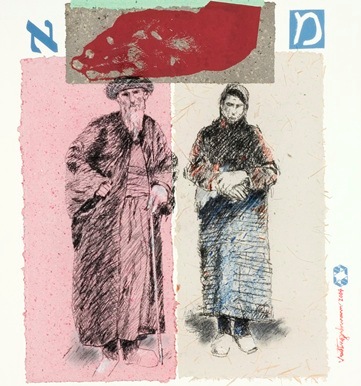Satirical Poem: a Trace of Union between the Three Cultures?
DOI:
https://doi.org/10.17851/1982-3053.6.10.110-116Keywords:
Medieval Hebrew Poetry, Satyrical Poetry, Yehuda al-HariziAbstract
Much has been researched on the seven centuries when Muslims, Christians, and Jews inhabited the Iberian Peninsula. Much has been written about the Convivencia, about the Golden Age of Iberian Jewry, about cultural exchanges and mutual influences between the three ethnic groups. My goal here is to focus on the appreciation of the genre of satirical poetry by the ethnic groups. Among the Jews, satire has been practiced since biblical times. Among the Arabs, the maqama genre allowed the emergence of poets of the level of al-Hariri. Among Christians, one of the mainstreams of Galician--Portuguese poetry was represented by the Songs of Scorn and Cursing. In the presentation, I will try to make hypotheses about the occurrence of possible influences, especially by and about Jews. For this, I’ll detain myself on two Jewish poets who distinguished themselves by their satirical compositions, Yehuda al-Harizi and Todros Abulafia.
Downloads
References
ALHARIZI, Judah. The book of Tahkemoni. Jewish Tales from Medieval Spain. (Translated and explicated by David Simha Segal). Oxford/Portland: The Littman Library of Jewish Civilization, 2003. 710 p.
AMÂNCIO, Moacir. A boda (Parte6 do Sêfer Tahkemoni), Iehudá al-Harizi. Manuscrito inédito, São Paulo, abril, 2011.
BOSSONG, Georg. Poesía en convivencia. Estudios sobre la lírica árabe, hebrea y romance en la Espana de las tres religiones. Gijón: Ediciones Trea, 2010. 400p.
CHOTZNER, J. Hebrew Satire. London: Kegan Paul, Trench, Trübner & Co. Ltd.; New York: The Bloch Publishing Co., 1911. 190p.
COLE, Peter (Ed.). The Dream of the Poem. Princeton and Oxford: Princeton University Press, 2007, 548p.
DECTER, Jonathan P. Al-Harizi’s Tahkemoniin English (Review). ProofTexts: A Journal of Jewish Literary History, v.23, n. 1. New York: The Jewish Theological Seminary, Winter 2003.p. 110-118.
MOISÉS, Massaud. Dicionário de termos literários. 3. ed. São Paulo: Editora Cultrix, 1982. 526p.
MONGELLI, Lênia Márcia. Fremosos Cantares: antologia da lírica medieval galego-portuguesa. São Paulo: Editora WMF Martins Fontes, 2009. 522p.
SÁENZ-BADILLOS, Ángel; TARGARONA BORRÁS, Judit. Poetas hebreos de Al-Andalus (Siglos X-XII) – Antologia. Córdoba: Ediciones El Almendro de Córdoba, 2003.232p.
SCHEINDLIN, Raymond P. Wine, Women, and Death. Oxford, New York: Oxford University Press, 1999. 204p.
SEGAL, David S. “Rhyme and Reason: The Thirty-Fourth Gate of Alharizi’s Tahkemoni” in ProofTexts: A Journal of Jewish Literary History, v. 3, n.3. New York: The Johns Hopkins University Press, January 1983. p. 55-62.
TAVANI, Giuseppe (Ed.). Arte de Trovar do Cancioneiro da Biblioteca Nacional de Lisboa. Edição crítica e fac-símile. Lisboa: Edições Colibri, 1999, 57p.
Downloads
Published
How to Cite
Issue
Section
License
Os direitos autorais pertencem exclusivamente aos autores. Os direitos de licenciamento utilizados pelo periódico é a licença Creative Commons Attribution 4.0 (CC BY 4.0): são permitidos o compartilhamento (cópia e distribuição do material em qualquer meio ou formato) e adaptação (remix, transformação e criação de material a partir do conteúdo assim licenciado para quaisquer fins, inclusive comerciais.






